
Orchestral Manoeuvres in the Dark (OMD) are an English electronic band formed in the Wirral, Merseyside, in 1978. The group consists of founding duo and principal songwriters Andy McCluskey and Paul Humphreys, along with Martin Cooper and Stuart Kershaw (drums). Regarded as pioneers of electronic music, OMD combined an experimental, minimalist ethos with pop sensibilities, becoming key figures in the emergence of synth-pop; McCluskey and Humphreys also introduced the "synth duo" format to British popular music. In the United States, the band were an early presence in the MTV-driven Second British Invasion.

George Andrew McCluskey is an English singer, songwriter, musician and record producer. He is best known as the lead singer and bass guitarist of the electronic band Orchestral Manoeuvres in the Dark (OMD), which he founded alongside keyboard player Paul Humphreys in 1978: McCluskey has been the group's sole constant member. He has sold over 40 million records with OMD, and is regarded as a pioneer of electronic music in the UK. McCluskey is noted for his on-stage frenetic 'trainee teacher' dance.

Junk Culture is the fifth studio album by English electronic band Orchestral Manoeuvres in the Dark (OMD), released on 30 April 1984 by Virgin Records. After the commercial disappointment of the experimental Dazzle Ships (1983), OMD and Virgin intended for the group to shift towards a more accessible sound on its follow-up release. The band retained much of their early experimental approach but embraced a wider range of influences than previously, drawing inspiration from pop, dance, Latin and black music. Frontman Andy McCluskey characterised Junk Culture as "the catchiest, poppiest album we've ever made".

Architecture & Morality is the third studio album by English electronic band Orchestral Manoeuvres in the Dark (OMD), released on 6 November 1981 by Dindisc. Inspired by religious music, the group sought to broaden their musical palette by utilising elaborate choral samples, the Mellotron, and other new instruments to create a more naturalistic, emotive sound. The artwork was designed by longtime OMD collaborator Peter Saville, along with associate Brett Wickens, while its title was derived from the book Morality and Architecture by David Watkin.
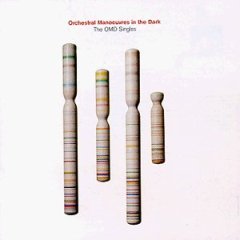
The OMD Singles is a singles compilation album by Orchestral Manoeuvres in the Dark, released in 1998. It reached number 16 on the UK Albums Chart. Originally, the compilation was to include a second disc of new remixes; however, this idea was abandoned due to budget limitations. The few remixes that were produced were released separately as The OMD Remixes. In 2003, The OMD Singles was reissued in France with the remix disc finally included, comprising the 1998 remixes as well as additional remixes. In the same year Virgin also released a two-disc box set comprising The OMD Singles and Navigation: The OMD B-Sides.
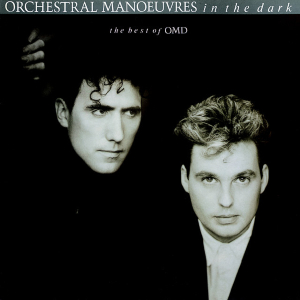
The Best of OMD is a compilation album by English electronic band Orchestral Manoeuvres in the Dark (OMD), released in 1988; marking a decade since the band's beginnings. The record essentially delineates the group's experimental early years from their pop-oriented later work: side one features recordings from 1979 to 1984, while side two is drawn from the group's 1984–1988 efforts.

"If You Leave" is a 1986 song by English electronic band Orchestral Manoeuvres in the Dark (OMD). It was recorded for the soundtrack to the film Pretty in Pink (1986), in which it is played prominently during the final scene. Along with 1980's "Enola Gay", the track has been described as OMD's signature song.
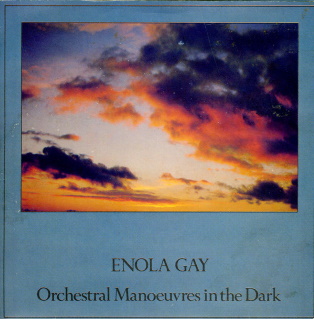
"Enola Gay" is an anti-war song by the English electronic band Orchestral Manoeuvres in the Dark (OMD), and the only single taken from their second studio album Organisation (1980). Written by lead vocalist and bassist Andy McCluskey, it addresses the atomic bombing of Hiroshima by the aircraft Enola Gay on 6 August 1945, toward the conclusion of World War II. As is typical of early OMD singles, the song features a melodic synthesizer break instead of a sung chorus.
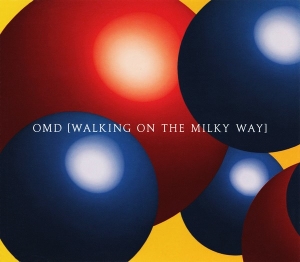
"Walking on the Milky Way" is a song by English electronic band Orchestral Manoeuvres in the Dark (OMD). It was released as a single on 5 August 1996 and appeared on their Universal album a month later. The song reached number 17 on the UK Singles Chart, becoming the group's first UK top-20 hit in over five years, and their last UK top-40 single. The band were flanked by a full string orchestra for their Top of the Pops performance of the song broadcast on 16 August 1996.
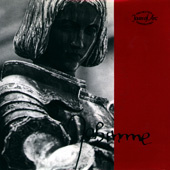
"Joan of Arc" is a 1981 song by English electronic band Orchestral Manoeuvres in the Dark (OMD), released as the second single from their third studio album Architecture & Morality. It was well-received by critics and became an international hit, reaching the Top 5 in the UK and Canada and number 13 in Ireland.

"Joan of Arc (Maid of Orleans)" is a song by English electronic band Orchestral Manoeuvres in the Dark (OMD), released in 1982 as the third single from their third studio album, Architecture & Morality. To prevent confusion with the group's previous single "Joan of Arc", the song was retitled "Maid of Orleans (The Waltz Joan of Arc)" for its single release. Both songs are about the French heroine Joan of Arc and both reached the Top 5 of the UK Singles Chart—although this release was more successful internationally, topping the charts in several countries including Germany, where it was the biggest-selling single of 1982. "Maid of Orleans" has sold four million copies worldwide.

"Red Frame/White Light" is the second single by English electronic band Orchestral Manoeuvres in the Dark (OMD). The song is about a red telephone box in Meols, on the Wirral peninsula in Merseyside, that was used by the group to make calls to organise their gigs in the late 1970s. The track is composed of two alternating major/minor sections, each built around a synthesizer hook. Lyrical content is minimal, comprising mostly brief, spoken word utterances. It was the band's first single to chart.

"Messages" is a song by English electronic band Orchestral Manoeuvres in the Dark (OMD) from their self-titled debut studio album (1980). A re-recorded version of the song was released on 2 May 1980 as the album's third and final single, reaching number 13 on the UK Singles Chart and becoming OMD's first top-40 entry. As with their debut single "Electricity", "Messages" features a melodic synth break instead of a sung chorus.

"Locomotion" is a song by the English electronic band Orchestral Manoeuvres in the Dark (OMD), released on 2 April 1984 as the lead single from their fifth studio album, Junk Culture (1984). It was one of the band's biggest European hits, charting within the Top 5 in the UK, Ireland, Belgium and the Netherlands, while also peaking at No. 14 in Germany.

OMD Live: Architecture & Morality & More is a live album and DVD by Orchestral Manoeuvres in the Dark, based on the group's 1981 album, Architecture & Morality. It was recorded at the Hammersmith Apollo, London on Saturday 19 May 2007.
Dindisc was a UK record label, an imprint of Virgin Records but operating semi-independently, which issued new releases from mid-1979 through early 1982. It is no longer active, but CD reissues on Virgin still mention the label and have Dindisc catalogue numbers.
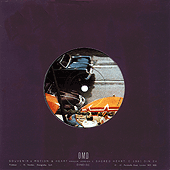
"Souvenir" is a song written by Paul Humphreys and Martin Cooper of English electronic band Orchestral Manoeuvres in the Dark (OMD), and released as the first single from the group's 1981 album Architecture & Morality. Sung by Humphreys, the track is characterised by its use of slowed-down choral loops, and showcases OMD's early approach of utilising a synthesizer hook in place of a vocal chorus. The song has garnered praise from critics and fellow artists.
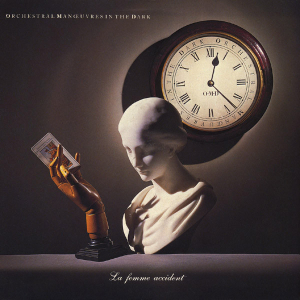
"La Femme Accident" is a song by the English electronic band Orchestral Manoeuvres in the Dark (OMD), released as the third and final single from their sixth studio album Crush (1985). Like two of their previous singles, it references Joan of Arc. Unlike those two singles, it was not a substantial hit, peaking at No. 42 in the UK.
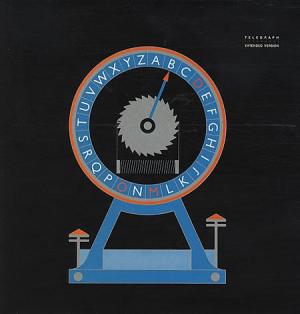
"Telegraph" is a song by English electronic band Orchestral Manoeuvres in the Dark (OMD), and the second single from their studio album Dazzle Ships (1983). "Telegraph" was originally slated to be the first single released, but being unhappy with the mix and with pressure from Virgin, the group instead opted for "Genetic Engineering".
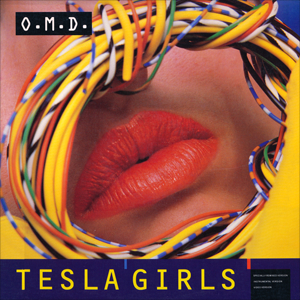
"Tesla Girls" is a song by the English electronic band Orchestral Manoeuvres in the Dark (OMD), released as the third single from their fifth studio album, Junk Culture (1984). It peaked at No. 21 in the UK and Ireland, and No. 8 on the Dutch Top 40. Although only moderately successful on the charts, it became one of the group's biggest club hits.



















